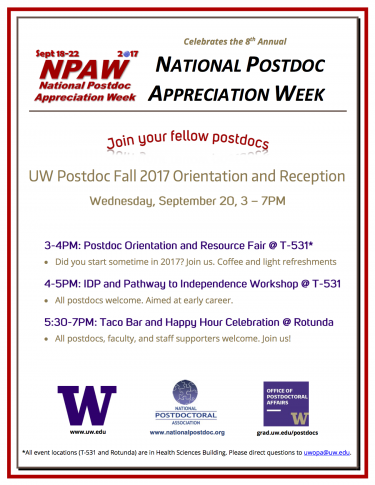Traditional views of leadership suggest that you need a title or status to be a leader. However, true leadership can be seen at every level of a team or organization regardless of title or status. Consider this: are you stepping into your full potential as a leader during your time as a postdoc? Leadership skills are always at the top of the list for any sector in jobs you may be seeking, inside or outside academia. We share insights gleaned from top leaders visiting UW throughout the quarter as part of the Husky Leadership Initiative (and yes, we want to have a postdoc contingent in this next year!)
Purpose: Start with your “why”. The “what” you are doing will change and evolve over time and with different opportunities. But the central purpose to your work, and how you engage with it, will be what opens doors and draws others to you.
Be curious: There is evidence to show that starting a conversation from a stance of inquiry opens a conversation. This is far more productive than a judgment or accusation, which can close down or narrow a decision. It is more likely to get you where you want to go, and will leave the person with positive regard for you rather than resentment.
Vulnerability: Rather than being a weakness, rumbling with your own vulnerability is one of the most courageous acts there can be. Developing awareness of your vulnerability, rather than guarding against it or pretending it isn’t there can help you to ask for the help you need, seek contributions from others and work toward genuinely co-creating solutions.
Conflict as generative: We often talk about “normalizing feedback” – where everyone has an opportunity to reflect on what’s going well (specifically) and identify a place we can improve. The challenge is transitioning from a culture where conflict has been toxic (judgmental, personal, emotional) to one where it can be healthy.
Superchickens3 don’t win. All of this may seem antithetical to the traditional academic and grant-funded environment we find ourselves in, where competition is the norm. However, research on effective teams and innovative leaders shows that competitive environments become places where people perform at much lower productivity levels: because they are scared, under pressure and not sharing ideas that may grow creative solutions.
Take a moment and reflect on your own teamwork and leadership style. It does not mean being the most charismatic, outgoing or decisive person. Genuine leaders are humble enough to know they do not hold all the answers; they are curious to know what others can bring to the problem or mission at hand. Whatever role you play within your group, you can ask thoughtful questions, invite others to speak and share, value contributions of others, and provide guidance in shaping team or project direction. We believe in you and see you as leaders everywhere throughout our UW ecosystem — thank you.
And thanks to the community leaders who came forward this quarter to generously share their insights about leadership, and the Husky Leadership Initiative.
Deep dive:
- Brene Brown, Dare to Lead. Random House, 2018
- Amy Edmundson, Building a psychological safe workplace.
- Margaret Heffernan, Why it’s time to forget the pecking order at work. (Opens with the superchicken example if you want to learn more!
- Simon Sinek, Start with Why.
